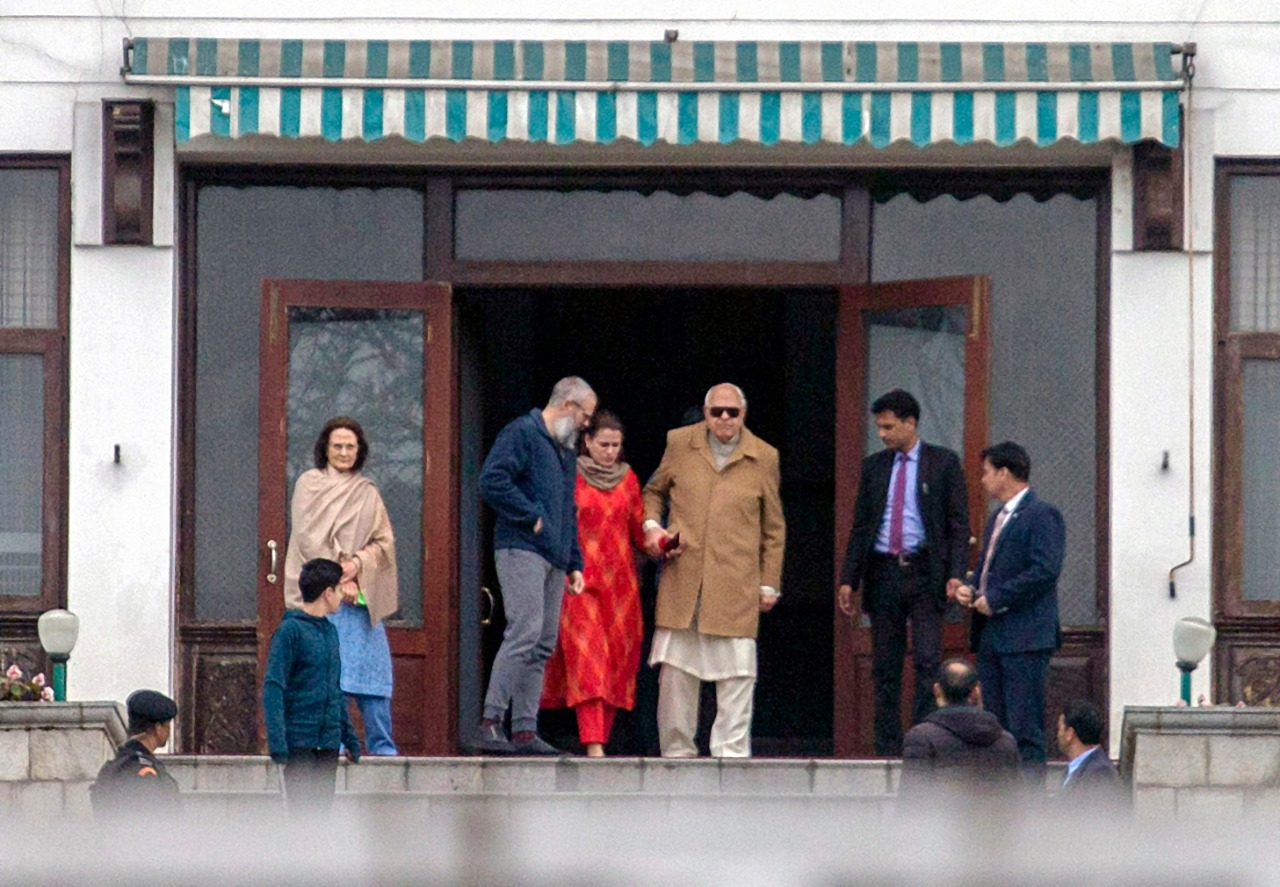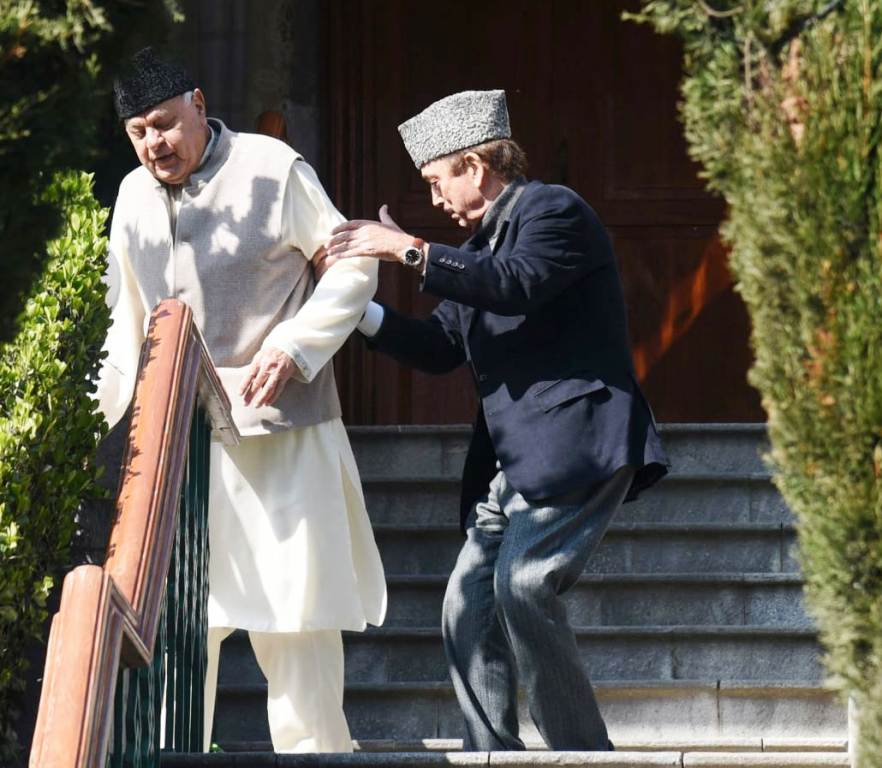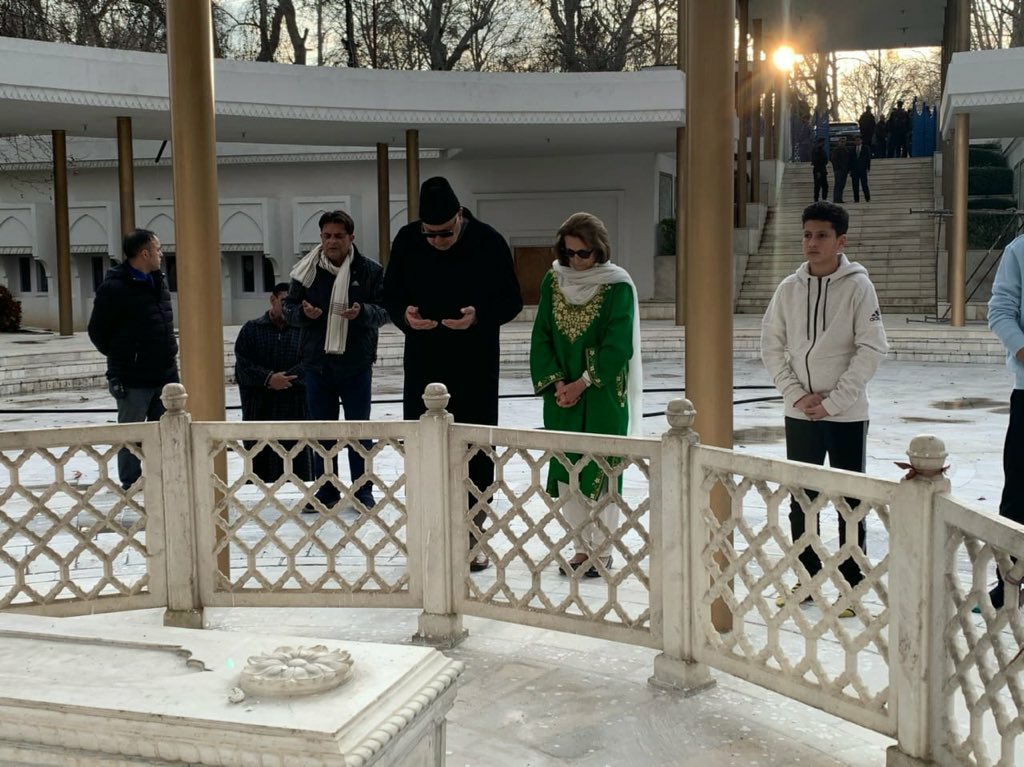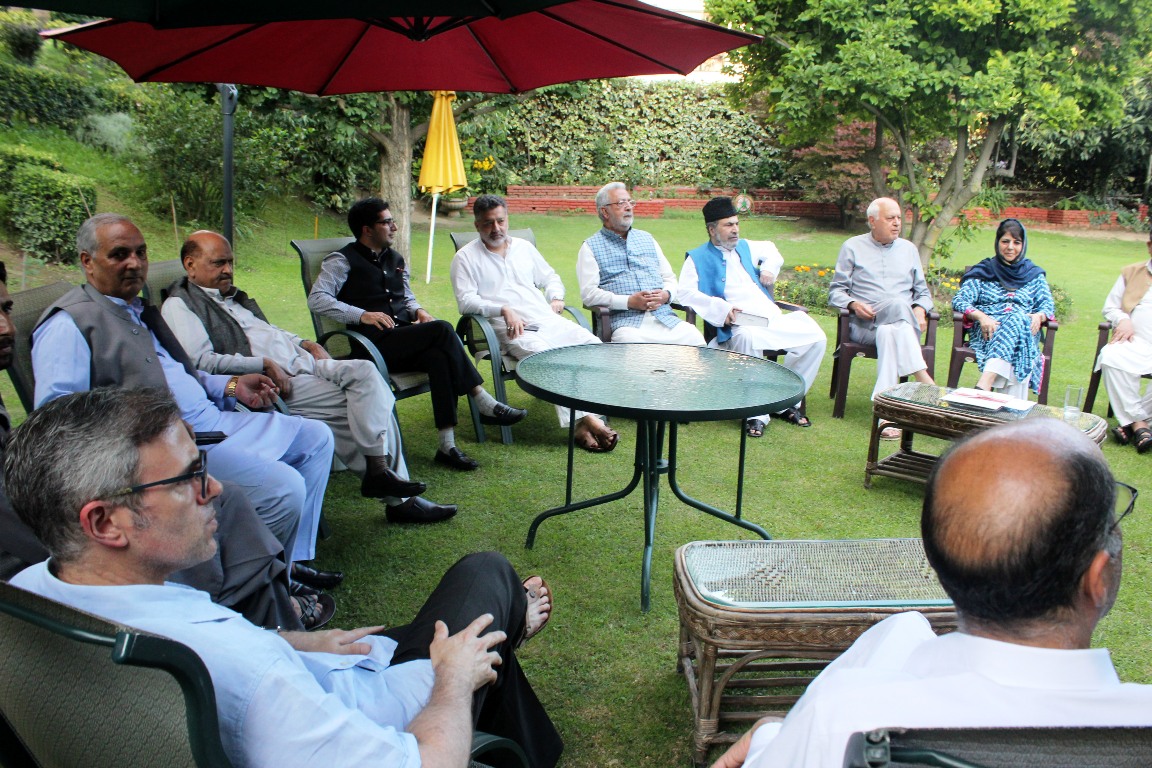SRINAGAR: The release of Dr Farooq Abdulah, the president of National Conference, is being seen a major development in Jammu and Kashmir’s political landscape after post-August 5 decision that unilaterally rolled back the special status and bifurcated the state of Jammu and Kashmir into two Union Territories.

The release has given a new lease of life to the political activities that have barely started with the political workers and leader visiting Dr Farooq. The five-time Chief Minister has not been making any major statement other than the fact that all political leaders should be freed and that all the political parties must start working towards the shifting of Jammu and Kashmir detainees, currently in outside jail to home jails. He has asserted that he will be talking on political issues only after all the political leaders will be set free.
At the same time, however, various newspapers have commented editorially on the development. These commentaries bring in some detail of the new policy that will be unfolding in Jammu and Kashmir in coming days. Here are the editorials:
Rebuild trust: It is time to release Jammu & Kashmir’s political prisoners
The Times of India
March 17, 2020
Recently released from his seven-month detention, partly under the Public Safety Act, former Jammu & Kashmir chief minister Farooq Abdullah has now asked for bringing back all J&K detainees who remain in jails outside the Union territory. It will be recalled that more than 5,000 people were detained after the nullification of Article 370 on August 5 last year. This was done with a view to maintaining peace in J&K after the revocation of its special status. True, like Abdullah, many detainees have been released since. But hundreds continue to be detained in jails outside J&K.

In fact, the matter was also raised by a delegation of the newly formed Apni Party from J&K in its meeting with Union home minister Amit Shah. The latter assured the delegation that political prisoners would be “freed in time to come” based on ground realities. But since Kashmir has been relatively peaceful and government has already managed to largely convince the international community that nullification of Article 370 was India’s internal matter, this is the best time to release political detainees. The message has gone home that Article 370 was a temporary provision of the Indian Constitution, which will not be restored under any circumstances. Now, for normalisation to return there has to be political reconciliation, even as political actors focus their energy on restoring statehood for J&K.
New Delhi has repeatedly said that it wants to accelerate J&K’s development and bring large investments to the region. Putting off political reconciliation now will foster greater alienation, which could trigger a vicious cycle and make the job more difficult later. Releasing political detainees will be the first step towards rebuilding trust and laying the foundation of a new J&K. It shouldn’t be put off further.
Abdullah’s Release
Kashmir Observer
March 16, 2020
In a surprise move, J&K government on Friday ordered the release of former chief minister and Member Parliament Dr Farooq Abdullah. The government didn’t extend Abdullah’s detention under Public Safety Act which expired today, effectively paving the way for his freedom after seven months of incarceration. Abdullah along with other major Kashmiri leaders including his son Omar Abdullah, also a former chief minister, were detained on August 5 when Centre withdrew Article 370 that granted J&K its semi-autonomous status within Indian Union.
Abdullah has since steered clear of talking about Article 370 or criticize the Centre for its revocation. In a statement, Abdullah has said the current environment in Kashmir wasn’t conducive for such a political discourse. He has instead demanded release of prisoners and shifting of those lodged in outside jails to Kashmir. It is difficult to predict what Abdullah will do in near future. Will he take on an antagonistic line towards Centre as can be expected considering his party’s long-standing political position on Article 370 or will he be more restrained in pressing his demand? These are the questions for whose answers we may have to wait. Abdullah can also chose to be reconciliatory as has been the general drift of his politics – albeit, he can intermittently be unpredictable and temperamental.

It is also not immediately clear what made Abdullah’s sudden release possible. More so, when the government had recently extended the detention under PSA of Omar and Mehbooba Mufti, another former chief minister. Incidentally, two weeks ago, former RAW chief A S Dullat had met Abdullah at his Gupkar Road residence. And now, in an interview, Dulat has given an impression that he acted as a conduit between Abdullah and Centre.
Some people have also pointed towards external pressue. Recently, Representative Pramila Jayapal had sponsored the bipartisan House Resolution 745 in US, which although not binding, urged India “to reinstate internet access, release those detained, and preserve religious freedom.” However, it is unlikely that the foreign pressure alone would have forced New Delhi’s hand. Abdullah’s release is believed to be the part of a larger Kashmir gambit. The move would have been unlikely if Centre expected Abdullah to embark on a vociferous opposition to Article 370. So, what is up New Delhi’s sleeve? Much of it, however, will be clear by how Abdullah chooses to act.
It would be interesting, how Abdullah approaches Syed Altaf Bukhari’s Apni Party that is believed to have been created by New Delhi as an alternative to the NC and the PDP. There are thus many ways in which Abdullah’s release can play out. But for now we can only wait and watch. What people in Kashmir would immediately want is the restoration of political activity where the leaders can speak freely. Here’s hoping Kashmir gets to that environment soon.
Farooq Abdullah’s release a welcome first step
Deccan Herald
March 16, 2020
The release of former Jammu and Kashmir chief minister Farooq Abdullah after seven months of detention is a welcome gesture from the Centre. The government has not made any comment on it, but it may be considered as part of a move to better deal with the situation that has emerged after the scrapping of Article 370 in August last year. Abdullah, two other former chief ministers Mehbooba Mufti and Omar Abdullah, and many other political leaders were detained then, some of them under the draconian Public Safety Act. The 82-year-old Dr Abdullah’s release may be sudden, but it is not a surprise because the government was known to be in contact with him. Former RAW chief AS Dulat visited him last month and it could only have been at the behest of the government. So, it is most likely that there is a plan behind his release.
After his release, Abdullah has rightly said that his freedom is not complete without the release of other leaders like his son Omar Abdullah and Mehbooba Mufti. There is a political vacuum in Kashmir after the detention of most leaders of regional political parties. Such a vacuum exists in other areas of life also. The lockdown and the restrictions on communications aggravated the situation. These have been gradually relaxed, but many are still in place. The government has tried to present a normal image of Kashmir to the outside world and even arranged the visits of foreign delegations there. It is also holding panchayat elections in the erstwhile state. But these do not give a credible picture of normalcy. There are reports of militants being arrested or killed in encounters and radicalism gaining ground. Infiltrations from across the border have been reported and there may be more such pressure in the wake of the US-Taliban accord in Afghanistan.
No normalcy is possible in Kashmir without the restoration of the political process there. This calls for the release of all detained leaders and engagement with them. Some leaders who belonged to the National Conference (NC), the People’s Democratic Party (PDP) and the Congress have launched a new party called the Jammu and Kashmir Apni Party this month. This party has the blessings of the Modi government. The day after Abdullah’s release, Prime Minister Narendra Modi told representatives of the new party that his government would work to restore the statehood of J&K “at an early opportunity’’. This is the first specific statement from the Prime Minister about a government plan for Kashmir. The plan has to necessarily include the widest political spectrum in Kashmir, and Abdullah’s release might well be a signal that Delhi understands this.
The Centre’s Kashmir moves are welcome
Hindustan Times
March 16, 2020
Release other leaders, continue to allay apprehensions, and reach out to citizens
Over the past week, the government has taken two positive steps with regard to the situation in Jammu and Kashmir (J&K). The first is the decision to release former chief minister, National Conference leader, Member of Parliament, and one of the senior-most figures in Indian politics, Farooq Abdullah. The second is the reassurance given by both Prime Minister Narendra Modi, and home minister Amit Shah, to representatives of the newly-formed J&K Apni Party that there are no plans to change the demography of the Union Territory (UT). The home minister went a step further and said that J&K will have a better domicile policy than other regions. And the Centre assured political leaders that the gradual restoration of statehood remained on the agenda.
Both steps, seen together, are an indication that the Centre has, somewhat belatedly, recognised the need for normal political and democratic activity to be restored in the UT. Mr Abdullah’s detention was legally tenuous and politically counterproductive and sparked international concern. It is also time to release the other two former chief ministers — Omar Abdullah and Mehbooba Mufti — and allow them to express their views freely, and conduct political activity. All these leaders have firmly stood by the Indian Union in difficult times, and despite their differences with the government’s current approach, their fundamental rights must be respected.
The Apni Party will need to be the voice of Kashmiris, rather than of the Indian State, if it is to win credibility on the Srinagar street. It is noteworthy that the party has indeed conveyed apprehensions that exist on the ground that the nullification of Article 370 will lead to a change in the composition of the population. It is equally noteworthy, and laudable, that at the highest levels, the government has allayed these apprehensions. The Centre must now build on it, unveil a more intensive outreach, and come up with a concrete plan that leads up to the restoration of statehood. This is the only way to restore political normalcy in J&K, even as the security apparatus remains alert and battles violence and cross-border terrorism.
Now that Farooq Abdullah is ‘free’, will Kashmir be back to normal soon?
The Asian Age
March 16, 2020
Dr Abdullah’s release yields the surmise that the Narendra Modi government has just had an attack of realism
The release of National Conference patriarch and former J&K chief minister Farooq Abdullah from detention on Friday — a sudden but not wholly unexpected development as it had been hinted at for over three months in the context of New Delhi needing this expedient to navigate a respectable way out of the logjam in Kashmir into which it recklessly wandered in August when it whittled down Article 370 of the Constitution — is a welcome turn in events. After uncertainty and gloom, it makes positive political outcomes in J&K appear realisable.

A day after Dr Abdullah emerged free in Srinagar, Prime Minister Narendra Modi said that “at an early opportunity” his government would work with “all sections of the people” of J&K to realise the hopes of statehood — in effect making J&K’s recent status as a Union territory a short-lived affair.
The irony is that the PM’s remarks were addressed to a delegation of Kashmir’s just-launched Apni Party, a conglomerate of self-seeking renegades with little mass appeal brought into being through the Centre’s machinations as a “king’s party” in order to end the old era of Valley politics — dominated by the Abdullahs and the Muftis — and inaugurating a new one by pressing quislings into service.
Dr Abdullah’s release and the PM’s statement yield the surmise that the Narendra Modi government has just had an attack of realism. In that case, the effective shelf life of the Apni Party may be severely curtailed.
Dr Abdullah is in his mid-80s, and suffers from physical ailments. But he remains Kashmir’s most-admired leader. His release thus seems a symbolism of some magnitude — a gesture of goodwill and peace toward the people of the Valley, who until recently were sought to be reviled by the ruling BJP.
The National Conference president, after the end of his detention, indicated strongly in his public remarks that he will respond to political stimuli only when two other former CMs — his son Omar and the PDP’s Mehbooba Mufti — as well as dozens of other political figures are also set free. When these terms are met, life in J&K may be deemed to have returned to near-normal in the changed historical circumstance that has come into being after the extinguishing of Kashmir’s autonomy on August 5 last year.

Will the political spectrum of the Kashmir Valley readily or willingly accept the delimitation of Assembly constituencies in J&K before they become due in the normal course in order to satisfy the long-held RSS-BJP agenda to create more seats in the Hindu-dominated Jammu region, thinking this will give the BJP an advantage? Will the Centre agree to hold Assembly polls this year as state polls (under the earlier dispensation) are held every six years in J&K?
It’s unlikely that NC or PDP will accept the political suzerainty of the fledgeling Apni Party in an Assembly election. As such, will the BJP defer to the return of normal politics after freeing the remaining political leaders of Kashmir? If this happens, the international pressure on the Modi government may ease
Course Correction
The Tribune
March 16, 2020
Govt should release other political leaders in J&K too
Farooq Abdullah has been released after seven months of detention. This marks a welcome change in the intransigent attitude of the Centre, ever since the revocation of Article 370 that guaranteed special status to Jammu and Kashmir and subsequent political developments. There was no real justification for the continued incarceration of a man who has been Chief Minister thrice and is a Member of Parliament. With his release, there is hope that the Centre would feel compelled enough to release other political leaders too, including Farooq’s son Omar Abdullah, and Mehbooba Mufti, both former Chief Ministers.

The detention, under the Public Safety Act that allows imprisonment for up to two years without bail, and the unprecedented crackdown on the political leadership of Jammu and Kashmir since August 5 last year has been sharply criticised, both domestically and internationally. Releasing the 82-year-old Farooq will ease the international pressure and has already been welcomed by the media and Opposition leaders.
Farooq Abdullah is a seasoned leader, well versed in the dynamics of the relations between his state and the Centre. He has worn his Indianness as a badge of honour against Pak-sponsored terrorism at the international fora. His incarceration has only damaged the country’s image and his release and active participation in politics would hopefully repair it substantially. As of now, he is holding his cards close to the chest. He has asked for the release of his fellow politicians, eschewing any discussion on politics. He is, naturally, expected to provide leadership to the National Conference, which still has a sizeable presence in J&K, even as he and other political leaders navigate a world vastly different from the one that existed before their arrest. The Centre has taken the first step towards restoring the political process in the state-turned-UT. It is a sign of the times that even such a baby step is a harbinger of hope.
Incomplete Step
The Indian Express
March 16, 2020
Farooq Abdullah’s release is reminder of continued detention of many others in Kashmir. Government must follow through.
It would not be enough to simply welcome the release of member of Parliament and former Chief Minister of Jammu & Kashmir Farooq Abdullah. It must also be pointed out that a grave violation of fundamental rights was committed by placing him, other political leaders, and thousands of others under detention in the first place. No valid reasons were given for invoking the J&K Public Safety Act against the National Conference chairman, or indeed against two other chief ministers and other politicians, just as no reason has been given now for why such a danger to public safety — for that is what slapping him with the PSA had implied — has now been let go from house arrest. Or should it be inferred from the government’s actions that arrest and a case under a draconian law are only instruments to be deployed and withdrawn at its discretion and whim?

The 80-year-old Abdullah, who underwent two cataract surgeries while in detention, has been restrained since his release, stating that while a “free and frank exchange of political views is essential” to understand the Centre’s actions in J&K since August 5, 2019, he will not make any political statements until such time as the others remain in detention, and that he will keep what he has to say for Parliament. It is not known if the Centre has had any dialogue with Abdullah or reached an “understanding” with him, as is being suggested in some quarters. But what appears to be clear is that the government may have realised that the newly floated Jammu & Kashmir Apni Party can neither be a credible alternative, nor even begin to engage with the people of Kashmir and kickstart the political process unless it begins releasing the former state’s established politicians. The engagement and participation of the National Conference, J&K’s biggest regional political party, is as essential to the political process as it ever was. What remains to be seen is if and how the NC, which passed an autonomy resolution in the J&K Assembly in 2000, will play in a game in which the goalposts have been radically shifted.
Farooq Abdullah himself has not made the demand that the others be released immediately, asking only for those imprisoned outside the former state to be brought back to J&K “pending their release” as it will enable their family members to meet them more easily in the time of coronavirus. Yet the release of the detained politicians, including Abdullah’s son Omar, and the People’s Democratic Party leader, Mehbooba Mufti, several other topline leaders and many more, under house arrest and in prisons in and outside J&K, is imperative. The government must lose no time in taking the next step.
Way to go: On Farooq Abdullah’s Release
The Hindu
March 16, 2020
The Centre must do more to restore normalcy in J&K, and return it to full statehood.
The release of five-time Chief Minister of Jammu and Kashmir Farooq Abdullah on Saturday after seven months in detention is a welcome step that could open fresh political possibilities in the troubled region. The conditions of his release, if any, are not public but it is clear that there were backchannels open between him and the Centre before the release. Taken together with other recent relaxations in J&K that was put under a lockdown last August as the Centre unilaterally ended its special constitutional status, his release could help reopen the public space in the Valley. Coinciding with his release, Prime Minister Modi assured a delegation of the newly formed Apni Party led by former People’s Democratic Party (PDP) leader Altaf Bukhari that he would work towards the restoration of statehood for J&K, which was downgraded to a Union Territory as part of last year’s restructuring. Mr. Modi also said no demographic changes would be forced in J&K. Earlier, mobile telephony was restored fully and mobile Internet partially. However, restrictions on assembly remain largely in place, and hundreds, including two former Chief Ministers, Omar Abdullah and Mehbooba Mufti, still remain in detention. Their staggered release could be the next step towards normalcy.

Mr. Modi’s moves have often been characterised by surprise and subterfuge, including on J&K. There could be justification for such secrecy in statecraft, but new beginnings in the Valley will require more openness as there is a considerable trust deficit between its people and New Delhi. The Centre should not try to orchestrate politics but engage with it as it organically evolves. Hard as it is, the Centre must try and undo the damage it did to mainstream parties such as the National Conference and the PDP. It must allow all opinions to be articulated. Coercive measures must be limited to combating violence. It must shun the baseless notion that communities will surrender political autonomy in return for material prosperity. Above all, it must end its perilous propensity to paint the demands for autonomy and separatism with the same brush. J&K’s instrumental status as a place for demonstrating the strength of the Indian nation in the current government’s imagination is not helpful. There is also an evolving international situation that could complicate the situation. With the long-expected U.S. withdrawal from Afghanistan now imminent, Islamist forces in South Asia are feeling triumphant and are using the current communal turmoil in India to paint it as a Hindu theocracy. The Pakistani military establishment will exploit the situation to India’s disadvantage. India’s approach towards J&K must be people-centric and guided by a resolute commitment to its diversity and religious pluralism.
Detention of Farooq Abdullah revoked
Daily Excelsior
March 15, 2020
Certain decisions are taken, at times quite reluctantly, all in the interests of the administration to ensure that peace, tranquillity, public order and trust in the Government machinery remained intact rather reigned supreme. Most of us recall what Woodrow Wilson had said about the state that it was a people organised for law within a definite territory. Basically, life is assured and safety guaranteed only when law was not only properly organised but enforced as well. Enforcement, at times could be with bitter layer followed by honey sweet layers. In a place, politically and otherwise highly pliable, any statement or speech or even a call for a protest against any action of the executive could spell doom and when it is the issue of abrogation of much hyped Article 370, about which lot of hot political magniloquence had made rounds much in advance, preventive detention in the shape of confining one either to one’s house or shifting to a comfortable temporary “rendezvous” had become an unavoidable choice. Dr. Farooq Abdullah, three times Chief Minister, Chief Patron of National Conference, a former Union Minister and presently an MP had to face mobility curtailments under the Public Safety Act only as a preventive measure.
Now that nearly after seven months of ‘detention’, he is free, it is a matter of satisfaction while at the same time being demonstration of pragmatism on the part of both the UT and Central Governments in that anticipating a very positive political role to be played by Farooq Abdullah looking to various aspects. Having headed the erstwhile state as Chief Minister three times, Farooq is fully aware of the nitty-gritty of Kashmir politics.
Last but not the least, Articles 370 and 35 A being now consigned to pages of history, has to be admitted gracefully and proceeded further, there being no other alternative. In other words, thinking seriously on these lines could help in further strengthening the threads of peace, tranquillity, normal activities and the equilibrium of endowments of people.
We have no qualms with his wish and expectations that “I hope other political leaders would be released soon, I will be able to take a decision on the future only after other leaders are released.” Since the process has started right from the senior most mainstream politician of Jammu and Kashmir, hopefully it would be in respect of other leaders as well. Otherwise also, gradually most of the detainees have been released and are being released except the ones who are facing court cases for various offences. Jammu and Kashmir has suffered a lot, mainly and basically due to treacherous and chicanery manoeuvrings of Pakistan, cross border terrorism, infiltrations, sending trained and indoctrinated infiltrators into this side to create mayhem and destruction. A perceptible brake has been applied on that after nearly three decades of created unrest. Let the achievements be consolidated, furthered, strengthened and to enable an era of peace and economic progress usher in.
It is heartening to observe that political activities under the democratic set up have started taking place in Jammu and Kashmir. Consolidating different political leanings and ideologies, forming new political parties or future coalitions and the like are positive offshoots of mainstream politics and should be seen from a positive angle. Dr. Farooq Abdullah, now free to restart political activities, could contribute a lot and project himself in a new exalted portrayal since he has options under the country’s democratic set up, liberty and freedom to still play many more political innings with intent to ensure peace and progress of Jammu and Kashmir.
Being the most experienced mainstream politician of the UT, Centre should utilize his services for resumption of political activity in the region.















